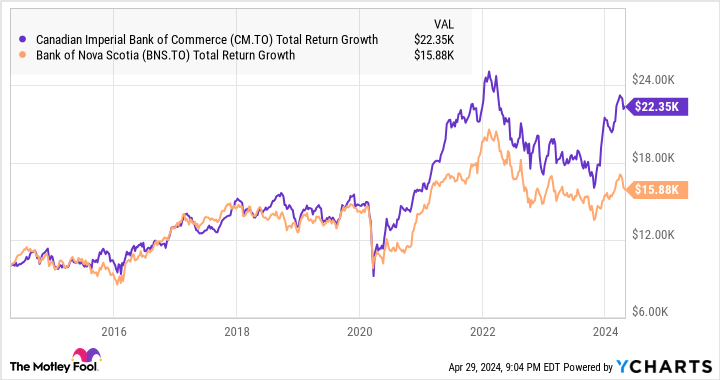Better Bank Buy: Scotiabank Stock or CIBC?

Written by Kay Ng at The Motley Fool Canada
Some fund managers say that it’s not a good idea to hold too many Canadian banks because they’re in the same sector. Therefore, they’re subject to the same risks. For example, big Canadian banks Bank of Nova Scotia (TSX:BNS) and Canadian Imperial Bank of Commerce (TSX:CM) typically experience weaker earnings during economic downturns or recessions.
History tells us what happens to the banks in recessions
In the last two recessions, here’s how weak their earnings were.
Due to the impacts of the COVID-19 pandemic, Scotiabank witnessed its adjusted earnings per share (EPS) drop by 25% in fiscal 2020. However, its adjusted EPS rebounded 10% higher than in fiscal 2019 by fiscal 2021. Similarly, COVID-19 impacted CIBC, which saw adjusted EPS drop 19%. CIBC’s adjusted EPS rebounded 21% higher than in fiscal 2019 by fiscal 2021.
The global financial crisis resulted in Scotiabank’s adjusted EPS falling 18% from fiscal 2007 to fiscal 2009. By fiscal 2011, its adjusted EPS climbed 16% higher than the fiscal 2007 levels. Similarly, during this period, CIBC witnessed its adjusted EPS drop 31% from fiscal 2007 to fiscal 2009. By fiscal 2013, CIBC’s adjusted EPS was 2% higher than in fiscal 2007.
In both cases, the banks at least maintained their dividends throughout the harsh operating environment.
Earnings quality and dividend safety
In the past decade, based on adjusted EPS, Scotiabank increased its earnings by almost 27% (or 2.4% per year). In the period, it increased its dividend per share by almost 75% (or almost 5.8% per year). Based on adjusted EPS, its fiscal 2023 payout ratio was approximately 64%.
In the past 10 years, CIBC increased its adjusted EPS by almost 53% (or almost 4.4% per year). In the period, it increased its dividend per share by 81% (or almost 6.1% per year). Based on adjusted EPS, its fiscal 2023 payout ratio was approximately 51%.
Both banks experienced meaningful drops in their earnings during the pandemic. Investors can expect meaningful drops in their earnings again during future recessions. However, both banks have maintained sufficient buffers in their payout ratios to protect their dividends.
Over the last decade, CIBC has offered better safety for investors by having higher earnings growth, which also resulted in a faster-growing dividend. Indeed, the same $10,000 investment in CIBC delivered higher returns than an investment in Scotiabank, as illustrated in the graph below. CIBC stock delivered total returns of north of 123%, while Scotiabank stock delivered returns of about 59%.
CM Total Return Level data by YCharts
Going forward
Both big Canadian bank stocks trade at blended price-to-earnings ratios of about 9.7. At $64.79 per share at writing, CIBC stock offers a juicy dividend yield of almost 5.6%. Based on a fairly valued stock and assuming a 5% EPS growth rate going forward, investors can approximate long-term returns of just north of 10% per year.
At $63.48 per share at writing, Scotiabank offers an even higher dividend yield of nearly 6.7%. This suggests that it’s higher risk than CIBC as the market commands a higher yield in the stock. Assuming it’s able to deliver a similar growth rate of 5%, it could deliver returns of close to 12% per year over the next five years. If that doesn’t happen, and it experiences below-average earnings growth of, say, 2.5%, investors would get returns of about 9% instead.
Scotiabank stock also has a chance of outperforming CIBC stock — if it experiences higher growth. Whether it succeeds or not depends on if its international growth strategy plays out over the next five to 10 years.
CIBC is likely a better buy
Based on this overview, defensive investors are probably better off eyeing CIBC and buying shares on meaningful dips. That said, income-hungry investors would find Scotiabank’s dividend valuable and a potential addition to their diversified income portfolio.
The post Better Bank Buy: Scotiabank Stock or CIBC? appeared first on The Motley Fool Canada.
Should you invest $1,000 in Bank of Nova Scotia right now?
Before you buy stock in Bank of Nova Scotia, consider this:
The Motley Fool Stock Advisor Canada analyst team just identified what they believe are the 10 best stocks for investors to buy now… and Bank of Nova Scotia wasn’t one of them. The 10 stocks that made the cut could potentially produce monster returns in the coming years.
Consider MercadoLibre, which we first recommended on January 8, 2014 ... if you invested $1,000 in the “eBay of Latin America” at the time of our recommendation, you’d have $15,578.55!*
Stock Advisor Canada provides investors with an easy-to-follow blueprint for success, including guidance on building a portfolio, regular updates from analysts, and two new stock picks each month – one from Canada and one from the U.S. The Stock Advisor Canada service has outperformed the return of S&P/TSX Composite Index by 32 percentage points since 2013*.
See the 10 stocks * Returns as of 3/20/24
More reading
Can You Guess the 10 Most Popular Canadian Stocks? (If You Own Them, You Might Be Losing Out.)
How to Build a Bulletproof Monthly Passive-Income Portfolio in 2024 With Just $25,000
Fool contributor Kay Ng has positions in Canadian Imperial Bank Of Commerce. The Motley Fool recommends Bank Of Nova Scotia. The Motley Fool has a disclosure policy.
2024

 Yahoo Finance
Yahoo Finance 
